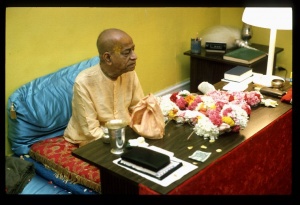SB 11.17.30

A.C. Bhaktivedanta Swami Prabhupada
Please note: The synonyms, translation and purport of this verse were composed by disciples of Śrīla Prabhupāda
TEXT 30
- evaṁ-vṛtto guru-kule
- vased bhoga-vivarjitaḥ
- vidyā samāpyate yāvad
- bibhrad vratam akhaṇḍitam
SYNONYMS
evam — thus; vṛttaḥ — engaged; guru-kule — in the āśrama of the spiritual master; vaset — he should live; bhoga — sense gratification; vivarjitaḥ — freed from; vidyā — Vedic education; samāpyate — is completed; yāvat — until; bibhrat — maintaining; vratam — the vow (of brahmacarya); akhaṇḍitam — unbroken.
Translation and purport composed by disciples of Śrīla Prabhupāda
TRANSLATION
Until the student has completed his Vedic education he should remain engaged in the āśrama of the spiritual master, should remain completely free of material sense gratification and should not break his vow of celibacy [brahmacarya].
PURPORT
This verse describes the upakurvāṇa-brahmacārī, who enters gṛhastha-āśrama, or family life, after completing his Vedic education. The word evaṁ-vṛttaḥ indicates that although one may eventually marry and become prominent in society as an intellectual, politician or businessman, during student life one must remain without false prestige as a humble servant of the bona fide spiritual master. The naiṣṭhiki-brahmacārī, who never marries, is described in the following verse.